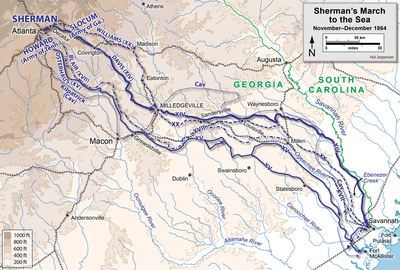Sherman’s Atlanta Campaign and March to the Sea
Sherman held the Atlanta Campaign as an effort to demoralize the South. Atlanta was the last important city and good thing for the South left. The loss of Atlanta would provide no hope for the South's future. The Union felt that if they destroyed Atlanta, it would speed up the process of ending the Civil War. Lincoln also wanted to end the war quickly so his chances of reelection would not drop. The major railroads would also be destroyed, and the destruction would cause issues in the South's military leadership. Lee replaced Johnston with General Hood because Johnston was not aggressive enough when fighting. (just like Lincoln replaced McClellan). Hood was forced to evacuate when his supply lines were demolished by Sherman's army. Sherman stayed in Atlanta for two months prior to him leading the March to the Sea. This was dangerous for him because he would have to live off of whatever supplies the city has now and he wouldn't be able to get back-up soldiers by train or any more ammunition and artillery.
Before his march to the sea, Sherman wanted to evacuate the citizens of Atlanta before burning it down. As Sherman started his march, his soldiers had a celebratory party and got drunk. As a result, they wreaked havoc on the city without realizing what they were doing by burning houses and buildings down. Sherman's policy of destruction wad to make Georgian's weary of the terrors of war so they would want to end it. (other names for his policy of destruction are; "hard war", "total war", and "scorched earth".) As they walked toward Savannah slaves joined the army and only made it stronger. At the end of Sherman's march, his soldier's had caused about $1,000,000 worth of destruction. When the Union finally reached Savannah, the governor surrendered.

This map shows what the Atlanta Campaign looked like. :

This shows the path Sherman took on his march to the sea. : etc.usf.edu
No comments:
Post a Comment